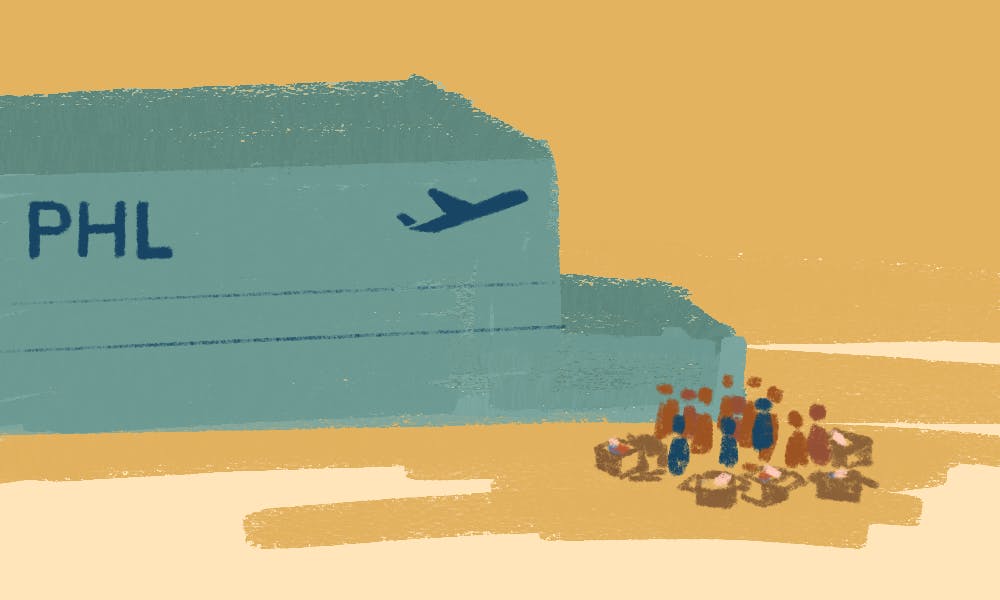In the past year, the Philadelphia International Airport has transformed into a key resettlement site for Afghan refugees, with Philadelphia becoming one of the few selected cities in the United States to accept 50,000 Afghan refugees fleeing poverty, warfare, and violence.
The influx of Afghan migration is largely due to the recent takeover by the Taliban in August 2021—one which has given new urgency to the humanitarian crisis in Afghanistan. The Taliban’s inhumane regime has decimated the economy, suppressed women’s rights, executed dissenters, and deprived Afghan civilians of water, shelter, healthcare, and food. As of mid–September, 95 percent of Afghans have insufficient food consumption, with an estimated 3.2 million Afghan children under five expected to suffer from acute malnutrition.
According to Philadelphia Mayor Jim Kenney, the inclusion of Afghan refugees in Philadelphia is being spearheaded by the federal government. In the airport, officials from Homeland Security, the Red Cross and Philadelphia's emergency management aid Afghan refugees with their paperwork, do background checks, and test them for COVID–19. Afghan refugees are then temporarily resettled in military bases, such as Joint Base McGuire–Dix–Lakehurst in Burlington County, N.J.
After 15 to 30 days in the military base, refugees who have obtained legal residency status are relocated. Each person receives a $1,200–per–month stipend from the federal government for three months. After the allotted time period, they must be able to maintain affordable housing and have a livable income.
In Philadelphia, local organizations have stepped up to aid in the resettlement process by housing Afghans in hotel rooms, Airbnb rentals, or in homes with Philly residents who have volunteered to house refugees.
Organizations like HIAS Pennsylvania focus on helping Afghan refugees adjust by providing them with a furnished residency and helping them get Social Security cards, financial literacy lessons, and access to public benefits. HIAS PA officials also ensure that refugees receive a thorough medical screening from partner refugee health clinics at Penn Center for Primary Care or Children’s Hospital of Philadelphia.
Afghans of Philadelphia (AOP) is another organization that specifically dedicates itself to providing Afghan refugees with basic essentials. AOP routinely collects donations for Afghans—winter items for families, strollers for children, essentials for pregnant women, hygiene products, and undergarments. AOP also collects Qurans, prayer rugs, and educational supplies.
There are also actions that we can take to help Afghan refugees through this difficult transition. The Nationalities Service Center provides many opportunities to volunteer. Individuals can arrange to drive an arriving family from Philadelphia International Airport to their new home, teach refugees how to use SEPTA, deliver groceries, make or donate culturally–appropriate Afghan meals, and help NSC officials arrange housing.
Donating essential goods like furniture to the Philadelphia Furniture Bank, which connects clients with furniture and new bedding, or Uhuru Furniture and Collectibles, which offers free pick–up and delivery, can also go a long way. It’s also helpful to donate clothing to organizations like Cradles to Crayons, which provides young children in low–income or housing–insecure environments with essential items; The Wardrobe, which provides a stable source of clothing for individuals experiencing barriers to employment; or JCFS’ Our Closet, a program which provides emergency clothing packages for those in need.
And of course, donating any sum of money to local resettlement agencies—like HIAS PA, the Transforming Welcoming Fund, and Bethany Christian Services—can be extremely impactful.
But the reality remains: even with the recent groundswell in community engagement, there’s much more to be done. Though the federal government took the original initiative to bring in 50,000 Afghan evacuees, these numbers pale in comparison to other nations. Some 90 percent of 2.2 million Afghan refugees find safety in neighboring Iran and Pakistan. The federal government should aid larger numbers of evacuees, as well as provide them with more cash than a mere $1,200 monthly stipend.
The federal government could also provide more funds to local resettlement organizations. The government brings in Afghan refugees, only to neglect them upon arrival. There are no federally–funded literacy programs, job training programs, language services, legal services, healthcare, resettlement programs, or other basic services available. This is why it’s been left entirely up to the initiative of local organizations, many of which can be underfunded or understaffed, to provide Afghan refugees with access to basic necessities.
Federal officials shouldn’t be patting themselves on the back for doing the bare moral minimum. By this point, the ongoing nature of the humanitarian crisis in Afghanistan is unacceptable: More actions should be taken, more funds allotted, and more empathy afforded to the situation of Afghans. As members of the local community, it’s in our power to help and welcome Afghan refugees to the best of our ability.







